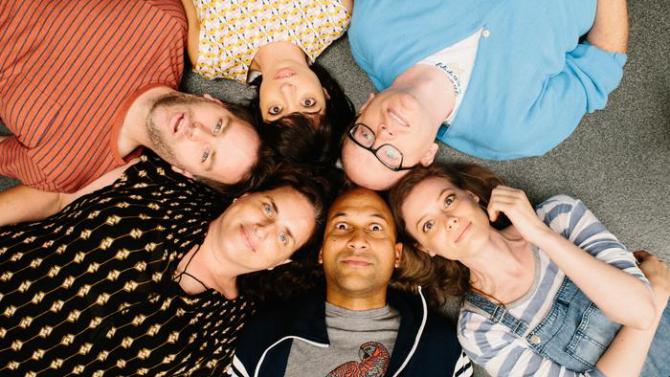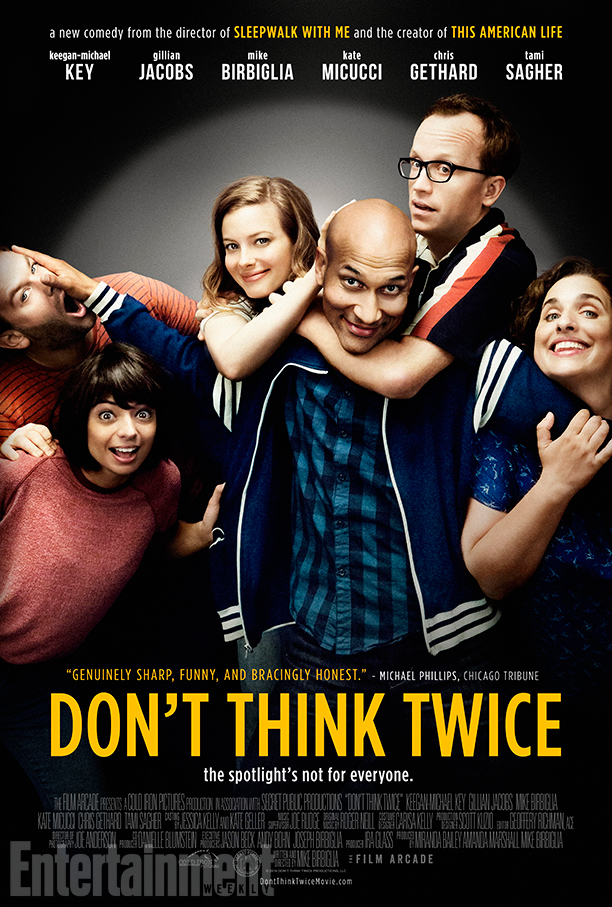Don’t Think Twice
Posted on August 4, 2016 at 5:53 pm
B+| Lowest Recommended Age: | Mature High Schooler |
| MPAA Rating: | Rated R for language and drug use |
| Profanity: | Very strong language |
| Alcohol/ Drugs: | Drinking, drugs |
| Violence/ Scariness: | Sad offscreen death |
| Diversity Issues: | Diverse characters |
| Date Released to Theaters: | August 5, 2016 |
| Date Released to DVD: | December 5, 2016 |
| Amazon.com ASIN: | B01IV40HUY |
Life is pretty much improv, after all. We are constantly challenged to respond to what we cannot predict. But we do not have the two foundational rules that make performance improvisation so compelling. First is “yes, and.” Whatever anyone on stage says or does, everyone else has to build on it. If someone says, “Wow, it’s cold in here,” no one is allowed to say, “What do you mean? We’re outside and it’s warm.” You have to say something that takes what the first person said to the next level, maybe “Yes, who turned the air conditioning down to 60?” Or even, “Well, there’s really no practical way to heat an igloo.” It is the high-wire without a net act of improv group’s lightning quick, sharply observed, and deftly funny scenes that audiences enjoy. 
The other fundamental rule is what improvers say to each other before they go on stage: “I’ve got your back.” Improv is about the group, not the individuals. “Don’t Think Twice” is the story of an improv group called The Commune, suggestive of its familial, interdependent, collegial quality. They are something like a family, if a dysfunctional one. While they have very different backgrounds and goals, the way they come together on stage is, at least for now, enough to make them feel they have a home together.
The closest thing they have to a leader is Miles (writer/director Mike Birbiglia of “Sleepwalk With Me”), who is a little older and taught many of them. He is still teaching improv classes and often has brief affairs with the young women who are his students. Samantha (Gillian Jacobs) and Jack (Keegan-Michael Key) are a couple. Allison (Kate Micucci) is a quiet woman who is working on a graphic novel. Jill (“Inside Amy Schumer” writer Tami Sagher) lives with her parents and is the only one who does not have money problems. And Bill (Chris Gethard) is making ends meet by handing out hummus and chips in the grocery store. “Your 20’s are all about hope. And then your 30’s are all about realizing how dumb it was to hope,” one character says.
The group is presented with some bad news and some good news, two crises that expose the fragility of their connection. They are about to lose their performing space, and there are no alternatives they can afford. And Jack and Samantha achieve the most coveted of opportunities, the chance to audition for a television program that is the equivalent of “Saturday Night Live,” a sketch comedy show that is a major cultural institution. Both put enormous pressure on the group, and the sense of desperation, jealousy, and competition shatters their pretense of unity and endless support for one another. At the same time, Bill’s father becomes critically ill, which gives them a way to continue to connect.
Birbiglia’s “Sleepwalk with Me” showed great promise. The transfer from stand-up to screen was awkward, but the atmosphere and the specifics of life on the road as a comedian were exceptionally well handled and he is on screen, as on stage, an engaging character. Here he once again takes us unto a very specific world that we can all relate to, especially when it comes to the way the characters use humor to reach a place of honesty. Birbiglia takes a risk here, making Miles less likeable, but it works as he very effectively creates real and vivid characters who have to figure out who they are when they are offstage. While the first film gave us one perspective, this one expands with a clear-eyed but generous take on each of them. So, the individual stories work and they provide balance and counterpoint. Even family members have to grow up, accept responsibility, and decide when to change course.
Parents should know that this film has very strong language, sexual references and an explicit situation, rude humor, sad death of a parent, drinking and drugs.
Family discussion: Why is it important to say “yes, and?” Is it sometimes hard for you to be happy when your friends succeed?
If you like this, try: “Sleepwalk With Me” and Mike Birbiglia’s short film on YouTube, “Fresh Air 2: 2 Fresh 2 Furious”



